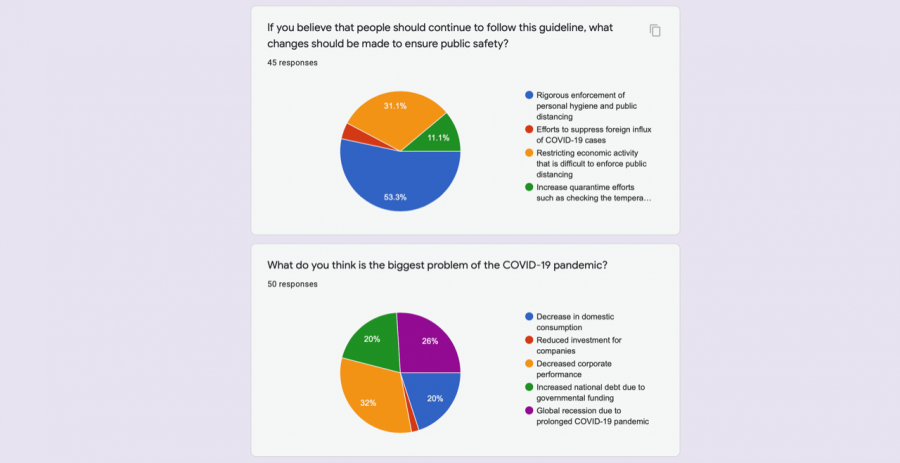COVID & the South Korean Economy
June 2, 2020
As the COVID-19 pandemic continues to rage on with over 6 million confirmed cases worldwide as of June 1, it is taking a notable toll on the global economy. In their World Economic Outlook Report, the IMF forecasts that the global economy is to contract sharply by -3 percent in 2020, severely impacting growth across all regions.
Naturally, the U.S. government is taking action to dampen the effects on the national economy. Ranging from distributing stimulus checks to funding treatment efforts, the federal government has responded to the pandemic with various levels of success.
But what about other countries?
South Korea was one of the first countries to reach a hundred new COVID-19 cases per day, but since then has successfully curved the growth of the pandemic. By using drive-through virus testing and contact tracing, the government was able to track and monitor potential patients.
South Korea’s government has had less success with curbing economic consequences. Companies in South Korea have a hard time getting loans due to their low credit ratings, and there are criticisms regarding the distribution of stimulus payments. The national debt is quickly rising, and healthcare workers at the front lines of the pandemic are exhausted.
What does the South Korean public think about the economic effects of COVID-19? What changes should the government make to alleviate these problems? Trying to get the answers to these questions, I surveyed about 50 people from my neighborhood to get their opinions. Here are the results:
About 72% of all participants reported that they spent less money than before the pandemic, about 25% less on average. The primary reason for this was the risk of contracting COVID-19 when going outside. Considering that the epidemic wasn’t over yet, this isn’t particularly alarming. Still, it shows the root cause of many economic problems.
For the question of what changes should solve the economic recession, most people responded with the development of a cure. This response shows that as long as there is a threat of COVID-19 infection, people will not spend as much as they usually do.
The next questions are about the efforts to encourage consumption in South Korea. The Korean government released a new, more lenient guideline on May 6 that allowed people to go outside. Most people were familiar with this measure, and 80% responded that it was effective in helping the economy. Of the 20% that responded that it was ineffective, income loss was a notable difficulty for them to spend money offline, and online shopping replaced the need for offline shopping.
Regarding the recent surge of infections centering on clubs in Seoul, 92% of responses still preferred the lenient measures than reverting to the stricter guidelines. Although aware of the risk of being infected, the majority of people believed that enforcing personal hygiene can overcome this problem.
There were many responses for the most prominent ramification of the pandemic, from the fall of influential companies to a sustained global slump. The responses to this question seem to depend on what problems it would directly cause to them, which varied among individuals.
Although determining results can be biased due to the small number of responses, there are few things to take away from this survey. The economic recession will likely continue until the public believes that it is safe to go outside. A more lenient set of guidelines can help the economy, given that personal hygiene is enforced and rules are in place. Prolonging this economic depression can cause a plethora of problems in multiple industries.
This information might seem unimportant since it does seem to directly apply to Americans, but the conditions that South Korea is experiencing will be the same for all the other countries. After the initial wave of cases, the dilemma of balancing public safety with the economy will be a universal problem, until the end of the COVID-19 pandemic. South Korea might be a glimpse of the future of your country, after all.










